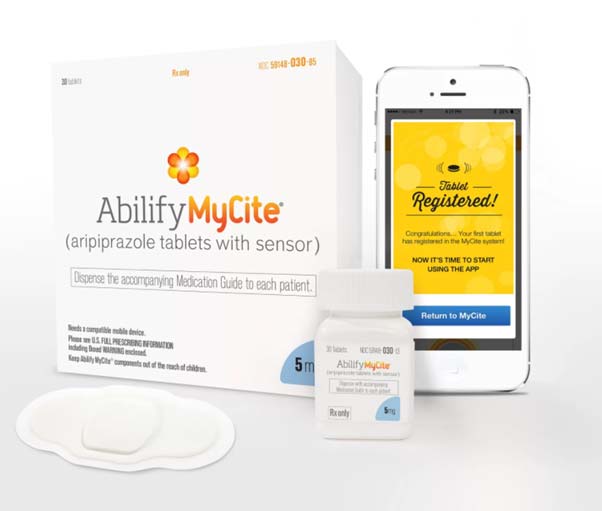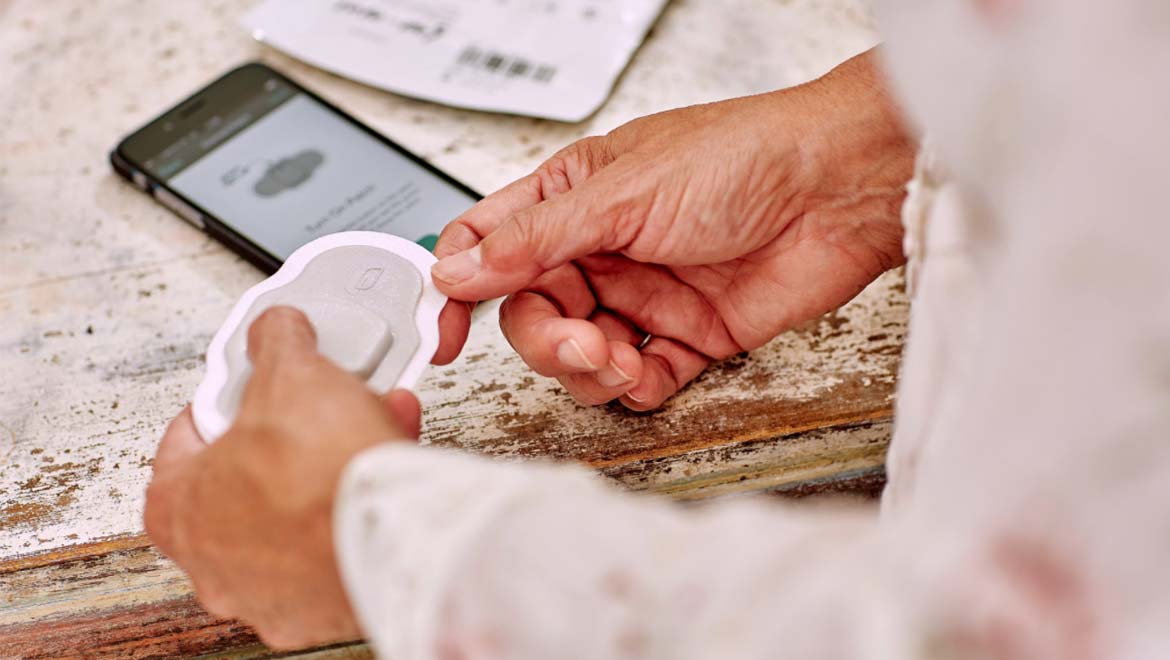The Food and Drug Administration (FDA) in the US has just approved the first digital pill for sale in the US. The pill, called Abilify MyCite, contains aripiprazole as the active ingredient. The development of the pill is a collaboration between the manufacturer of Abilify, Otsuka, and Proteus Digital Health who created the sensor.
Aripiprazole is used in the treatment of depression, bipolar disorder and schizophrenia and it is hoped that by combining this with a digital sensor may help with nonadherence – namely patients not taking their prescribed medication.
Digital pills
As well as containing the active ingredient, the pills are also enabled with a digital sensor made from silicon, copper and magnesium. The sensor is manufactured by the company Proteus, and is around the same size as a grain of sand.
The sensor is designed to generate small electrical signal when it comes into contact with stomach acid. This signal is then picked up by an adhesive patch which is worn on the patient’s abdomen, over the stomach region.
The patch then sends data to an app, via Bluetooth. This data includes the time and date that the tablet was taken, as well as the patient’s activity level. The app also allows patients to enter a number of other metrics, including their mood. This data is then also sent to a database which can be monitored by both the patient’s general practitioner and a number of other users including designated family and friends who have been given permission to view the app.
Improving compliance
The decision was made to initially use this technology in a pill for mental illness, which was explained by Mitchell Mathis, director of the Division of Psychiatry Products, based at the FDA’s Center for Drug Evaluation and Research. Mathis said: “Being able to track ingestion of medications prescribed for mental illness may be useful for some patients.”
This sentiment was echoed by John Kane, chair of psychiatry and the Donald and Barbara Zucker School of Medicine in New York. Of the approval for the pill, Kane spoke to The Pharmaceutical Journal and said: “For the first time in my years of experience as a psychiatrist, there is an innovative way to provide individuals with serious mental illness, and selected members of their families and care teams, with information on objective medication-taking patterns to help inform the patient’s illness management and personalised treatment plan.”

Abilify MyCite comes with an adhesive sensor (seen in the lower left of this image) and a smartphone app. Credit: Courtesy of Otsuka America Pharmaceutical, Inc.
Ethical concerns
Others were slightly unsure about the ethical considerations of providing a digital pill. The New York Times reported speaking to Dr Eric Topol, director of the Scripps Translational Science Institute, who said that he would become concerned if this kind of technology led to insurance companies offering an incentive to patients who complied with their treatment to the point that the technology became “so much incentivized that it almost is like coercion.”
Others are concerned about the decision to begin this process with a drug for those with mental illnesses. Dr Paul Appelbaum, director of law, ethics and psychiatry at Columbia University, said of the decision: “Many of those patients don’t take meds because they don’t like side effects, or don’t think they have an illness, or because they become paranoid about the doctor or the doctor’s intentions. A system that will monitor their behavior and send signals out of their body and notify their doctor? You would think that, whether in psychiatry or general medicine, drugs for almost any other condition would be a better place to start than a drug for schizophrenia.”
Of the concerns, Otsuka’s executive vice president and chief strategic officer Robert McQuade said: “It’s not intended for all patients with schizophrenia, major depressive disorder and bipolar. The physician has to be confident the patient can actually manage the system. We don’t have any data currently to say it will improve adherence.”
The intention will be to begin studies to investigate the impact of the digital pill on adherence levels soon after the pills go on sale.
It will be interesting to see the results from any studies investigating adherence to medication schedules, but it certainly seems as though digital technology has the possibility of influencing many different aspects of our lives, with this being a perfect example.
Top image: A wearable sensor patch made by Proteus Digital Health is part of the Abilify digital pill study. Credit: Proteus Digital Health







No comment